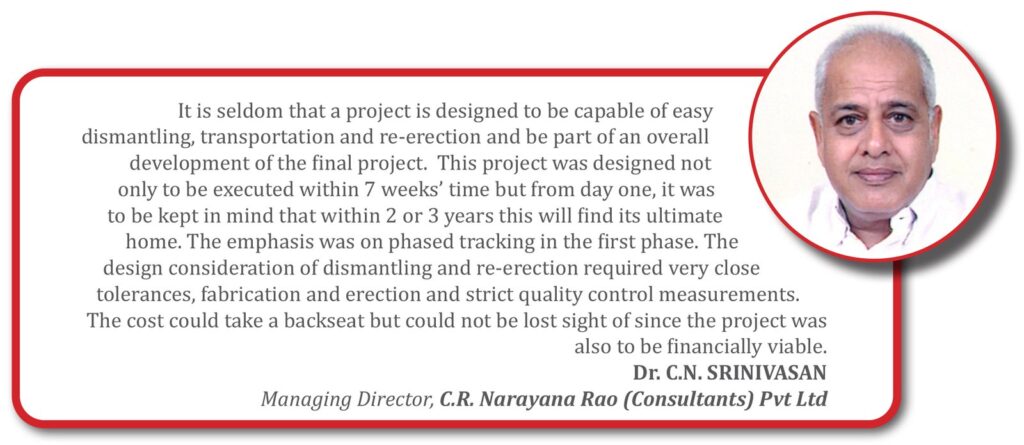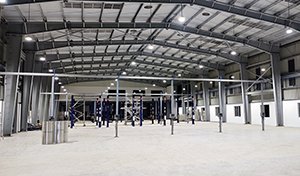During the 1960s, standardized engineering designs for buildings were first marketed as Pre-Engineered Buildings (PEBs). In the last few years, PEB steel structures have become quite popular. A PEB is a pre-designed and prefabricated steel structure that can be custom-made according to the requirement and assembled at a construction site.

PEB structures are used for making houses, office spaces, warehouses, hangars, factories, stadium structures, railway auditoriums, cold storage spaces and even shopping malls. They are made using steel beams and columns that can be shaped according to the requirements.
One of the key benefits of PEB buildings is that they can be built in much less time than conventional concrete buildings. The components are engineered beforehand and standardized. This reduces the engineering, production and erection time. The use of software for design and drafting speeds up the design phase. Moreover, the use of highly sophisticated machinery such as beam welding machines, plasma cutting machines and shear cutting machines greatly reduces the time of fabrication of built-up components.
PEB buildings are built of I-frames which are sturdy in nature and are designed to take heavy loads. Since load considerations are already taken into account before construction, this can greatly enhance the quality of the structure. They can also resist the effects of earthquakes.
Even before the manufacturing of a PEB structure starts, the quality of the materials to be used must be taken into consideration. The use of corrosion-resistant steel ensures that the structure can withstand different operating conditions. This reduces the maintenance required on the structure for a longer period of time.
Since most of the engineering of any PEB structure is done in the factory during the prefabrication stage, the efforts required at the actual construction site are greatly reduced. PEB structures can be easily transported to the site and assembled using bolts and nuts. Additionally, since the assembly process is easy, this reduces manual labor.
PEB structures also prove to be greatly cost-effective since the materials are chosen during the design phase and all the calculations are run beforehand, thus, efficient material usage and less wastage of money are ensured. Moreover, a PEB structure can be shifted from one place to another, giving one more return on your investment. Additionally, such structures are preferred for green projects are they are relocatable.

STRUCTURAL DETAILS
|
S.No |
Description |
UM |
Area / Weight / Value / Specification |
|
1 |
Building Area |
SM |
3000 |
|
2 |
Mezzanine Area |
SM |
1200 |
|
3 |
Total Weight |
MT |
235 |
|
4 |
Design Code |
|
MBMA |
|
5 |
Roof Sheeting |
|
0.5mm Bare Galvalume Screwed Down Single skin |
|
6 |
Cladding |
|
0.5mm Coated Galvalume Single skin |
PROJECT BRIEF
The clients run PAN India vehicle sales and services for almost all major brands of vehicles. They have an existing large facility, part of which was to be relocated for 2-3 years due to some business necessity. The relocation was at the Central Business District in Chennai on a lease-hold land due to the short duration for which the facility would exist at the new location.
DESIGN REQUIREMENT
There were some specific design requirements for this temporary facility. The buildable area needed to be maximized within a certain height restriction, in a narrow long site with restricted access. The pre-existing superstructure was to be completely dismantled, transported and reassembled at the new site so as to make it an integral part of the major facility that was going to be created. The new facility structure also needed to be capable of carrying heavy service loads and since the facility would be servicing MNCs, a high-class finish was expected. Apart from these, the facility needed to be cost-effective since it was short-term and had to have ease and speed of construction, dismantling and re-erection. All these works needed to be completed within 84 days in a tightly spaced site with access limitations.
CHOICE OF STEEL
The specifications of the project needed the structure to be factory fabricated and pre-assembled components with tight tolerances of quality control and quality assurance compliance. The structure material also had to be capable of standardization, interchangeability and flexibility. Steel was the obvious choice here and it won hands down against all the other competing technology, namely, in-situ construction with steel and concrete, precast concrete, etc.
The entire project consumed a total of 250 tons of steel.
STRUCTURAL DETAILS
Fixed Portal sitting has been used on the pile foundation. Single span gable type with heavily loaded mezzanine floor covers the entire gable and eaves end and extra provision of holes has been made in the portal. The mezzanine beam has been designed to receive an extensive requirement of the utility framework. In order to ensure full interchangeability of the utility framework, suspenders were standardized into three types with a telescopic arrangement. The structure has been designed for 100 years return period for wind forces with a design coefficient from FM Global.
PRIMARY & SECONDARY FRAME DETAILS
The entire construction for the primary and secondary frames has been completely bolted to meet the reusability of construction. To avoid damage during transportation through the restricted passageway, the pieces were fabricated in two lengths for the column and three lengths for the rafter. All the structures were fabricated to close tolerances. To facilitate standardization and interchangeability, only uniform segments were adopted. mezzanine beams were fabricated and assembled at the ground level and erected on a grid-to-grid basis for the speed of completion. Shear studs were not used for ease of reuse and sturdier than normal-size decking sheets were used.





